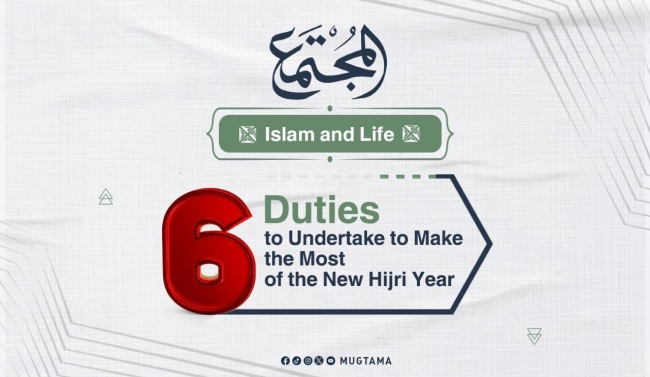6 Duties to Undertake to Make the Most of the New Hijri Year Featured
Among the most important deeds that a Muslim should perform throughout his life is to prepare well for the Day of Judgment. This happens through good planning for worship and making the most of the seasons of obedience in the best possible way. Good planning for worshiping Allah at the beginning of a new Hijri year will fill his record of deeds with actions that will testify for him. From this perspective, a Muslim should undertake several actions that help him achieve his desired goal at the beginning of the new Hijri year, including:
1. Intention:
One of the most important things that a servant should care about before starting any work is to purify his intention for Allah Almighty. The reward is linked to intentions. The Messenger of Allah (peace be upon him) said: "Deeds are to be judged only by intentions, and a man will have only what he intended." If the servant intends to draw closer to Allah through his ordinary actions, such as eating and sleeping, he will be rewarded. Thus, intention can result in mountains of good deeds from simple daily habits.
2. Determination:
Determination is needed for the servant to take the path of truth and remain steadfast on it, whether in his intention or actions. As mentioned in the words of the Prophet (peace be upon him): "O Allah, I seek refuge in You from the difficulties of the journey, and from returning in great sadness, and from loss after increase." It is part of the prophetic guidance to seek refuge in Allah from deviating from the truth after adhering to it and from going astray after being guided.
3. Knowledge:
Despite the great importance of knowledge, and that it comes before action as Allah said: "So know, [O Muhammad], that there is no deity except Allah and ask forgiveness for your sin" (Muhammad: 19), many people neglect it. A person's knowledge of the value of things enables him to prioritize them and set clear goals.
4. Reflection:
The one who is aware of the great purposes of creation is the one who considers the passage of time and fears that a moment might pass without earning a good deed, let alone wasting it in sins. What loss is greater than being heedless of the passage of time and the approach of death while the soul does not care about the passage of time!
5. Perseverance:
A person might be discouraged by the failure of previous plans, but he should seek Allah's help and persevere. Allah is Generous and does not tire until people tire. In the divine narration, Allah says: "… And if he draws near to Me an arm's length, I draw near to him a cubit, and if he draws near to Me a cubit, I draw near to him a fathom. And if he comes to Me walking, I come to him at speed." Therefore, a Muslim should not tire of perseverance until Allah grants him success.
6. Setting a Plan:
This stage is a result of the previous ones. After completing the previous steps, a Muslim should sit quietly and write down all his goals and what he will strive to develop in himself or achieve in various fields. He should then refine these goals, ensure they are prioritized according to their importance to him, and set a plan for implementation.
He should ensure that the plan is suitable for his nature and not beyond his capacity, so it does not become difficult for him to implement and thus abandon it. He should adopt the principle mentioned by the Prophet (peace be upon him) when asked: "Which acts are most pleasing to Allah?" He replied: "That which is done continuously, even if it is small." It is better for a servant to persist in small deeds than to start and not be consistent, then become frustrated and give up trying.
-------------------------------------------------------------







